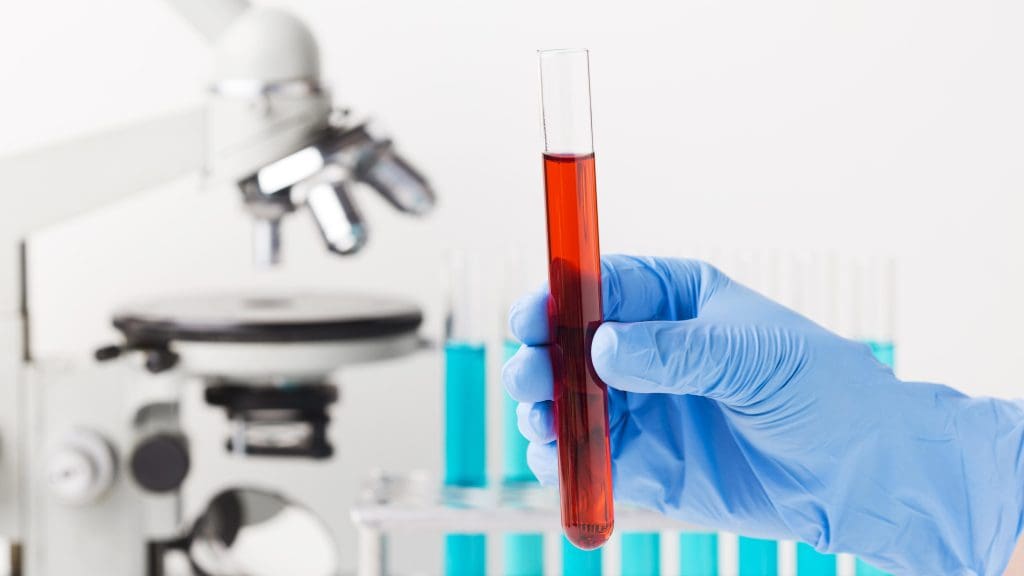Thalassemia is a genetic disorder that affects hemoglobin production and requires specialized medical care from a team of experts. Managing this complex condition requires a detailed treatment plan. What doctors deal with thalassemia?
Patients with thalassemia need a team of doctors, including hematologists and other specialists. This team is key to managing their condition well. So, doctors who treat thalassemia are very important for their care and support.

Key Takeaways
- Thalassemia requires specialized medical care from a team of healthcare professionals.
- A multidisciplinary team is necessary to manage the condition effectively.
- Hematologists and other specialists are critical in providing complete care.
- Doctors who treat thalassemia play a vital role in patient care and support.
- Effective management of thalassemia demands a detailed treatment plan.
Understanding Thalassemia: A Complex Blood Disorder
Thalassemia is a genetic blood disorder with different types and severity levels. It’s not just one condition but many that need specific care.
Types of Thalassemia and Their Severity
Thalassemia mainly includes alpha and beta types. The severity can differ a lot among people.
- Alpha Thalassemia: This happens when there’s a problem with the genes for alpha-globin. Its severity can be mild or severe, based on the gene issue.
- Beta Thalassemia: It’s caused by issues with beta-globin genes. It can be thalassemia minor (one gene problem) or major (two genes), with major being worse.
The severity of thalassemia depends on the genetic issues. It can cause mild anemia to severe, life-threatening problems.
Why Specialized Medical Care is Essential
Specialized medical care is key for managing thalassemia well. Experts in hematology and related fields are very important. They help:
- Correctly diagnose thalassemia type and severity
- Create treatment plans tailored to each patient
- Manage complications and improve life quality
Getting care from skilled healthcare providers helps thalassemia patients manage their condition. This way, they can live a fulfilling life.
Doctors Who Treat Thalassemia: An Overview of Specialists
thalassemia specialists
Managing thalassemia needs a team of medical experts. This condition affects the blood and overall health. So, many healthcare professionals work together to care for thalassemia patients.
Primary Care Physicians and Their Role
Primary care doctors are the first to see people with thalassemia. They help with the first diagnosis and ongoing care. They are key in coordinating care and sending patients to specialists when needed.
We count on primary care doctors to watch over the patient’s health. They also handle any other health issues the patient might have.
The Importance of Specialized Thalassemia Centers
Specialized thalassemia centers offer advanced care for these patients. They have teams of hematologists, transfusion medicine specialists, and more. They provide a coordinated care approach, covering all aspects of thalassemia management.
As one expert says,
‘Specialized centers are vital for the best thalassemia care. They give patients access to new treatments and clinical trials.’
Hematologists: The Core Specialists for Thalassemia Management
Thalassemia Management by Hematologists
Hematologists are key in treating thalassemia, a blood disorder. They have the skills to create treatment plans for each patient. This is because they know a lot about blood diseases.
Expertise and Training of Hematologists
Hematologists learn a lot about blood disorders like thalassemia. They understand the genetics and symptoms of thalassemia. They also know the best ways to treat it.
Key areas of expertise for hematologists include:
- Diagnosis of thalassemia using various laboratory tests
- Management of blood transfusions to maintain healthy hemoglobin levels
- Administration of iron chelation therapy to prevent iron overload
- Monitoring for complications associated with thalassemia
Diagnostic Approaches Used by Hematologists
Hematologists use different tests to find and understand thalassemia. These tests help them see how severe it is. The tests include:
| Diagnostic Test | Purpose |
| Complete Blood Count (CBC) | To assess hemoglobin levels and red blood cell indices |
| Hemoglobin Electrophoresis | To identify abnormal hemoglobin variants |
| Genetic Testing | To confirm the genetic mutations causing thalassemia |
Treatment Planning and Ongoing Care
Hematologists make treatment plans for thalassemia patients. These plans might include blood transfusions and iron chelation therapy. They also watch for any problems that might come up.
With the help of hematologists, thalassemia patients can manage their condition well. This improves their quality of life a lot.
Pediatric Hematologists: Specialized Care for Children
pediatric hematologists treating thalassemia
Caring for children with thalassemia needs a special touch. Pediatric hematologists are trained to handle this. They know how to tackle the unique challenges of treating thalassemia in kids.
Unique Challenges in Childhood Thalassemia
Childhood thalassemia comes with its own set of challenges. These include managing growth and development, addressing family concerns, and finding the right treatment for a child’s age and size. Pediatric hematologists are skilled in handling these complexities, providing care that meets each child’s unique needs.
One big challenge is how thalassemia affects a child’s growth and development. It’s important to monitor and adjust treatment plans regularly. This helps children with thalassemia live active, healthy lives.
Family-Centered Care Approaches
Pediatric hematologists know how vital family involvement is. Family-centered care treats the child and supports the whole family. This means educating parents, involving them in decisions, and giving them the tools to care for their child well.
By focusing on family-centered care, pediatric hematologists can improve treatment results. They also enhance the quality of life for children with thalassemia and their families.
Transitioning to Adult Care
As children with thalassemia grow up, they need careful transition planning. Pediatric hematologists are key in this process. They help young patients get used to adult healthcare and learn about managing their condition.
Effective transition planning is more than just moving medical records. It’s about teaching young adults to take charge of their care. This includes talking about treatment, lifestyle choices, and future family planning.
Transfusion Medicine Specialists: Managing Blood Replacement Therapy
thalassemia care and transfusion specialists
Managing thalassemia is more than just taking medicine. It also needs the help of transfusion medicine specialists for blood transfusions. These experts are key in making sure thalassemia patients get the blood they need to manage their condition well.
The Science Behind Blood Transfusions for Thalassemia
Blood transfusions are a big part of thalassemia care. They help increase healthy red blood cells in the body. Transfusion medicine specialists know a lot about blood transfusions. They understand the different types of blood components and what thalassemia patients need.
Thalassemia patients often need regular blood transfusions. The process is carefully planned and monitored. This ensures the blood is compatible with the patient’s blood type and reduces any risks.
Preventing and Managing Transfusion Reactions
Transfusion medicine specialists also play a big role in preventing and managing transfusion reactions. These reactions can be mild or severe. They include allergic reactions, febrile non-hemolytic transfusion reactions, and hemolytic transfusion reactions. Specialists use various strategies to lower the risk of these reactions. This includes using leukoreduced blood components and pre-medication with antihistamines or corticosteroids.
| Transfusion Reaction Type | Symptoms | Management Strategies |
| Allergic Reaction | Hives, itching, flushing | Antihistamines, corticosteroids |
| Febrile Non-Hemolytic Transfusion Reaction | Fever, chills | Antipyretics, leukoreduced blood |
| Hemolytic Transfusion Reaction | Severe anemia, jaundice | Immediate cessation of transfusion, supportive care |
Blood Banks and Donation Programs
Transfusion medicine specialists work with blood banks and donation programs. They ensure a safe and enough blood supply for thalassemia patients. Blood banks are key in collecting, testing, and storing blood donations. Donation programs help get and keep blood donors.
We know a well-coordinated blood supply chain is vital for thalassemia care. By working with blood banks and donation programs, transfusion medicine specialists help ensure thalassemia patients get the blood they need.
Iron Chelation Therapy Specialists: Combating Iron Overload
Iron Chelation Therapy
Managing iron overload is key in thalassemia care. Specialists in iron chelation therapy lead this effort. Iron overload happens when patients with thalassemia major get frequent blood transfusions. This excess iron can harm organs over time.
The Critical Role of Chelation in Thalassemia Care
Iron chelation therapy is a key treatment to lower iron levels in the body. Chelating agents bind to excess iron, helping remove it. This prevents damage to organs. Specialists tailor treatment plans to meet each patient’s needs, ensuring effective iron management.
Benefits of Iron Chelation Therapy:
- Reduces iron overload
- Prevents organ damage
- Improves quality of life
- Enhances survival rates
Types of Chelation Medications and Administration
There are many chelation medications, each with its own way of being given and side effects. The right medication depends on the patient’s age, iron levels, and health.
| Chelation Medication | Administration Method | Common Side Effects |
| Deferoxamine | Subcutaneous or intravenous infusion | Local reactions, hearing loss |
| Deferiprone | Oral | Nausea, agranulocytosis |
| Deferasirox | Oral | Gastrointestinal issues, renal impairment |
Managing Side Effects and Ensuring Compliance
It’s important to manage side effects to keep patients on iron chelation therapy. Specialists work with patients to watch for side effects and adjust treatment as needed.
Strategies for managing side effects include:
- Regular monitoring of iron levels and organ function
- Adjusting medication dosages
- Implementing supportive care measures
- Educating patients on the importance of adherence
By understanding iron chelation therapy and working with specialists, patients with thalassemia can manage iron overload. This improves their quality of life.
Cardiologists: Addressing Heart Complications
cardiac care for thalassemia
Heart problems are a big worry for thalassemia patients. Cardiologists are key in their care. They help manage iron overload, which can cause heart failure and arrhythmias if not treated.
Managing thalassemia needs a team effort. Cardiologists are a big part of this team. They make sure patients get the heart care they need to avoid long-term damage.
Cardiac Issues Related to Thalassemia
Thalassemia patients face heart problems like heart failure and arrhythmias. These issues come from chronic anemia and iron overload. They can also get cardiac siderosis, where iron builds up in the heart muscle.
It’s important to watch these heart problems closely and start treatment early.
Cardiac Monitoring Protocols
Cardiologists use different ways to check on thalassemia patients’ hearts. They use:
| Monitoring Technique | Purpose | Frequency |
| Echocardiography | Assess heart function and structure | Annually or as needed |
| Cardiac MRI | Measure iron overload in the heart | Annually |
| Electrocardiogram (ECG) | Monitor heart rhythm | At each visit or as needed |
These methods help find and manage heart problems early.
Treatment Approaches for Heart Damage
Cardiologists create special plans for thalassemia patients with heart issues. Their treatments might include:
- Medications for heart failure and arrhythmias
- Iron chelation therapy to lower iron levels
- Changes in lifestyle to boost heart health
By tackling heart problems early, cardiologists greatly improve thalassemia patients’ lives.
Endocrinologists: Managing Hormonal Complications
For thalassemia patients, endocrinologists play a key role. They help manage hormonal imbalances that affect quality of life. Thalassemia, a complex blood disorder, often causes hormonal issues due to iron overload and treatment side effects.
Common Endocrine Disorders in Thalassemia
Thalassemia patients face several endocrine disorders. Hypogonadism, or reduced gonad function, is common. It leads to delayed puberty, infertility, and osteoporosis. Growth hormone deficiency also occurs, affecting growth and development in children.
Thyroid dysfunction and adrenal insufficiency are other complications. Endocrinologists are vital in diagnosing and managing these conditions. They perform thorough evaluations and create treatment plans, often including hormone replacement therapy.
Reproductive Health Management
Reproductive health is a big concern for thalassemia patients. Endocrinologists help manage fertility and sexual health issues. For those with hypogonadism, hormone therapy can induce puberty and improve fertility.
They also guide on reproductive options, including assisted reproductive technologies. This helps with family planning.
Bone Health and Osteoporosis Prevention
Osteoporosis and bone health issues are common in thalassemia patients. Hormonal imbalances and iron overload are the main causes. Endocrinologists prevent and manage bone density loss through various strategies.
These include vitamin D and calcium supplements, hormone replacement therapy, and medications to boost bone density. Regular bone health monitoring is key. It allows for early intervention and treatment plan adjustments.
By tackling hormonal complications of thalassemia, endocrinologists greatly improve patient care. Their expertise ensures effective management of endocrine aspects. This improves health outcomes and quality of life for these patients.
Hepatologists and Gastroenterologists: Liver Care
Thalassemia patients often face liver problems. Hepatologists and gastroenterologists are key in their care. They deal with iron overload, which can harm the liver. Let’s see how these experts help thalassemia patients.
Liver Complications from Iron Overload
Iron overload is a big worry for thalassemia patients. It can cause liver fibrosis, cirrhosis, and even liver cancer. Hepatologists and gastroenterologists work together to manage these issues. They check the liver damage and find ways to prevent more harm.
Liver fibrosis happens when there’s too much scar tissue in the liver. It’s often due to too much iron. If not treated, it can turn into cirrhosis, which severely damages the liver.
Diagnostic Tools for Liver Assessment
Hepatologists and gastroenterologists use many tools to check the liver. These include:
- Liver function tests to see how well the liver is working.
- Imaging studies like MRI and CT scans to see the liver’s structure.
- Liver biopsy to directly look at liver tissue for damage or disease.
These tools help doctors understand liver damage. They guide treatment plans.
Treatment Approaches for Liver Damage
There are many ways to manage liver damage in thalassemia. Hepatologists and gastroenterologists might suggest:
- Iron chelation therapy to lower iron levels and protect the liver.
- Lifestyle changes like avoiding alcohol and eating well to help the liver.
- Medications for liver fibrosis or cirrhosis in some cases.
By working with patients and other doctors, hepatologists and gastroenterologists are key in keeping the liver healthy. This is important for thalassemia patients’ overall health.
Genetic Counselors and Medical Geneticists
Genetic counselors and medical geneticists are key for families dealing with thalassemia. They give important info and support. This helps families make smart health and family planning choices.
Understanding Thalassemia Inheritance Patterns
Thalassemia is passed down in an autosomal recessive way. This means a person needs two bad genes to have the condition. These experts explain how this works and the risks involved.
They tell families that carriers, with one good and one bad gene, usually don’t show symptoms. But they can pass the bad gene to their kids. If both parents are carriers, there’s a 25% chance with each baby that it will have thalassemia.
Reproductive Options for Families
Genetic counselors talk about different ways families can avoid thalassemia. These include prenatal tests, preimplantation genetic diagnosis (PGD) with IVF, and adoption.
Prenatal tests give families important info before a baby is born. PGD lets families pick healthy embryos, giving them a chance for a healthy child.
Psychological Support for Genetic Decision-Making
Choosing reproductive options can be tough emotionally for families. Genetic counselors and medical geneticists offer support. They help families deal with the emotional side of making these choices.
They create a safe space for families to talk about their feelings and hopes. This support is key in helping families through the emotional challenges of genetic conditions like thalassemia.
“Understanding the genetic basis of thalassemia is key for families to make smart reproductive health choices.”
A Genetic Counselor
| Parental Genetic Status | Risk of Thalassemia in Offspring |
| Both parents are carriers | 25% |
| One parent is a carrier, the other is not | 0% (but 50% chance of being a carrier) |
Bone Marrow Transplant Specialists: Curative Approaches
Bone marrow transplant specialists are key in treating thalassemia. They check if a patient can get a transplant, manage the transplant, and care for them after. They also work on gene therapy, a new hope for thalassemia treatment.
Evaluating Transplant Candidacy
The first step is to see if a patient can get a transplant. Doctors look at the patient’s health, how bad their thalassemia is, and if they match with donors. Bone marrow doctors for thalassemia help patients and families decide the best option.
The Transplant Process for Thalassemia Patients
When a patient is ready, the transplant starts. They get chemotherapy or radiation to get ready. The transplant is a big step, done by thalassemia transplant specialists. They make sure the new marrow works well and the body accepts it.
Post-Transplant Care and Follow-up
After the transplant, patients need careful watching. They manage side effects, check for graft-versus-host disease, and adjust meds. Post-transplant care is key, and specialists work with others to give the best care.
Gene Therapy: The Future of Curative Treatment
Gene therapy for thalassemia is also a promising treatment. It changes the patient’s genes to fix thalassemia. Though new, it gives hope and is a big step forward.
As research grows, treatments for thalassemia will get better. Bone marrow transplant specialists are at the forefront, working hard to improve care and life quality for patients.
Finding and Working with Thalassemia Specialists in the US
We help you find and work with thalassemia specialists in the US. Getting the right care is key for managing thalassemia well. A good healthcare team is essential.
Locating Specialized Treatment Centers
First, find a thalassemia treatment center that offers full care. The US has many centers with the latest technology and skilled doctors. These teams include hematologists, transfusion specialists, and cardiologists.
To find these centers, talk to your primary care doctor or search online. The Thalassemia Foundation and Cooley’s Anemia Foundation also have lists of centers in the US.
Insurance and Financial Considerations
Understanding insurance and costs is vital for thalassemia care. Check your insurance to see what’s covered. Know about any costs you might have to pay yourself.
Treatment centers have financial advisors to help with insurance and costs. Some drug companies also offer help to lower costs for patients.
Building an Effective Doctor-Patient Relationship
A strong doctor-patient relationship is key for managing thalassemia. This relationship is based on trust, open talk, and respect. Patients should ask questions and follow their treatment plan.
Good communication is not just between the patient and doctor. It involves the whole healthcare team. Patients should ask for help and talk about any problems. This teamwork ensures the best care for each patient.
Conclusion: Coordinated Care for Optimal Thalassemia Management
Managing thalassemia well needs a team effort. Healthcare experts from different fields must work together. This team includes thalassemia care physicians, hematologists, cardiologists, and more.
Together, they can tackle the complex needs of thalassemia patients. This teamwork improves patients’ lives and health outcomes. It also means care that fits each patient’s unique situation.
Specialized thalassemia centers and experts play a big role in care. They provide the support and treatment needed. With coordinated care, patients get better results and live better lives.
In the end, the best thalassemia care comes from teamwork. It ensures patients get all the support they need to do well.
FAQ
What kind of doctors should I consult for thalassemia treatment?
For thalassemia, you need a team of doctors. This includes hematologists, pediatric hematologists, and specialists in transfusion medicine. Also, experts in iron chelation therapy, cardiologists, endocrinologists, hepatologists, and genetic counselors are important.
What is the role of hematologists in managing thalassemia?
Hematologists are key in managing thalassemia. They diagnose it, plan treatments like blood transfusions, and manage iron levels. This helps control the condition and its effects.
How do pediatric hematologists care for children with thalassemia?
Pediatric hematologists focus on kids with thalassemia. They handle growth issues, family concerns, and care for the whole family. They also help kids prepare for adult care as they grow up.
What is the importance of iron chelation therapy in thalassemia management?
Iron chelation therapy is vital for thalassemia. It fights iron overload, a big problem. Specialists in chelation therapy help manage iron levels, prevent damage, and ensure patients stick to treatment.
How do cardiologists contribute to thalassemia care?
Cardiologists watch for heart damage in thalassemia patients. They set up cardiac monitoring and create treatment plans for heart issues. This ensures thalassemia patients get full care.
What is the role of genetic counselors in thalassemia care?
Genetic counselors explain the genetic side of thalassemia to families. They talk about inheritance, reproductive options, and offer support. This helps families make informed genetic decisions.
Can bone marrow transplant specialists cure thalassemia?
Yes, bone marrow transplant specialists can cure thalassemia. They check if a transplant is right for a patient, manage the transplant, and care for them after. This treatment can cure thalassemia.
How can I find specialized thalassemia treatment centers in the US?
To find thalassemia treatment centers in the US, look online or contact patient groups. You can also ask your doctor for recommendations.
What are the benefits of coordinated care for thalassemia management?
Coordinated care from different specialists offers complete care for thalassemia patients. It improves their life quality and outcomes.
How can I build an effective doctor-patient relationship for thalassemia management?
For a good doctor-patient relationship, talk openly and trust each other. Be ready to ask questions and understand treatment plans and options.









